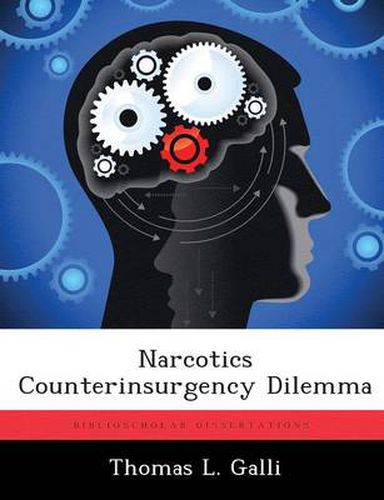Readings Newsletter
Become a Readings Member to make your shopping experience even easier.
Sign in or sign up for free!
You’re not far away from qualifying for FREE standard shipping within Australia
You’ve qualified for FREE standard shipping within Australia
The cart is loading…






This title is printed to order. This book may have been self-published. If so, we cannot guarantee the quality of the content. In the main most books will have gone through the editing process however some may not. We therefore suggest that you be aware of this before ordering this book. If in doubt check either the author or publisher’s details as we are unable to accept any returns unless they are faulty. Please contact us if you have any questions.
The purpose of this monograph is to investigate the relationship and linkages between insurgencies and the illicit narcotics trade in general; to examine the specific root causes and influences on the drug trade and insurgencies in Colombia and Afghanistan; to examine the historic background, strategic theory, and viability of the Plan Colombia model for application in Afghanistan; and to propose an alternate strategy for Afghanistan based on the significant differences in culture and governance between the two countries. Plan Colombia commenced in 1999 when the stability of the Colombian government reached a crisis level from the dual threats of an insurgency and the illegal drug trade. While the Marxist-inspired insurgency has been in existence and a significant problem for nearly the past fifty years, it originally focused on building its support base through ideological means. The nexus between illicit narcotics and the insurgency increased over the past forty years due to a symbiotic relationship that provides sustained funding for the insurgency and sustained sanctuary and resources for the illicit narcotics industry. The primary assumption behind Plan Colombia was that a disruption in the revenue base from illicit narcotics would reduce the ability of the insurgents to conduct operations and for a opportunity for successful engagement and negotiated settlement. Plan Colombia focuses on four specific lines of effort, which are the fight against illicit narcotics and organized crime, economic and social revitalization within Colombia, strengthening democratic institutions, and the disarmament, demobilization, and re-integration of the insurgent and guerilla organizations into Colombian society. In Afghanistan, the nascent government is also dealing with an insurgency that derives economic and social support from illicit narcotics, although the root of the narcotics issue is significantly different than in Colombia due to a history of warlordism, lack of a nati
$9.00 standard shipping within Australia
FREE standard shipping within Australia for orders over $100.00
Express & International shipping calculated at checkout
Stock availability can be subject to change without notice. We recommend calling the shop or contacting our online team to check availability of low stock items. Please see our Shopping Online page for more details.
This title is printed to order. This book may have been self-published. If so, we cannot guarantee the quality of the content. In the main most books will have gone through the editing process however some may not. We therefore suggest that you be aware of this before ordering this book. If in doubt check either the author or publisher’s details as we are unable to accept any returns unless they are faulty. Please contact us if you have any questions.
The purpose of this monograph is to investigate the relationship and linkages between insurgencies and the illicit narcotics trade in general; to examine the specific root causes and influences on the drug trade and insurgencies in Colombia and Afghanistan; to examine the historic background, strategic theory, and viability of the Plan Colombia model for application in Afghanistan; and to propose an alternate strategy for Afghanistan based on the significant differences in culture and governance between the two countries. Plan Colombia commenced in 1999 when the stability of the Colombian government reached a crisis level from the dual threats of an insurgency and the illegal drug trade. While the Marxist-inspired insurgency has been in existence and a significant problem for nearly the past fifty years, it originally focused on building its support base through ideological means. The nexus between illicit narcotics and the insurgency increased over the past forty years due to a symbiotic relationship that provides sustained funding for the insurgency and sustained sanctuary and resources for the illicit narcotics industry. The primary assumption behind Plan Colombia was that a disruption in the revenue base from illicit narcotics would reduce the ability of the insurgents to conduct operations and for a opportunity for successful engagement and negotiated settlement. Plan Colombia focuses on four specific lines of effort, which are the fight against illicit narcotics and organized crime, economic and social revitalization within Colombia, strengthening democratic institutions, and the disarmament, demobilization, and re-integration of the insurgent and guerilla organizations into Colombian society. In Afghanistan, the nascent government is also dealing with an insurgency that derives economic and social support from illicit narcotics, although the root of the narcotics issue is significantly different than in Colombia due to a history of warlordism, lack of a nati